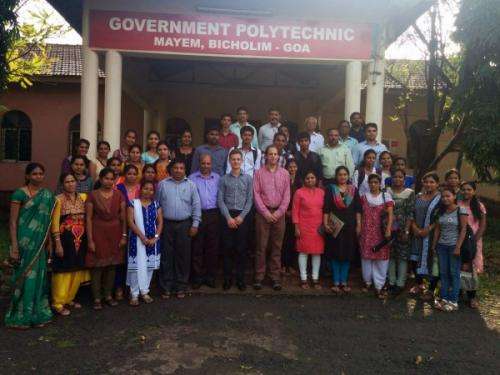Researchers develop sustainable concrete using plastic waste as a partial replacement for sand

Academics from the University of Bath are collaborating with Indian researchers in a two-year project to create environmentally-friendly concrete that uses plastic waste as a partial replacement for sand.
Demand for concrete from India's booming construction sector led to a rapid rise in unregulated sand extraction from riverbeds, to the extent that such mining is now banned in most Indian states.
Sand is essential to the mangroves which create the breeding grounds for wildlife and biodiversity and it also helps protect surrounding agricultural fields from salt water ingress during tidal rises.
Another consequence of India's rapid development is the unprecedented level of plastic waste arriving in landfill, much of which comes from carrier bags and packaging.
To solve both problems (a shortage of sand for construction and abundant plastic waste), the project team will design and produce an innovative concrete mix in which more than 10 per cent of the sand is replaced with shredded plastic waste. The research will also investigate how using plastic in place of sand within concrete affects its strength, durability, fire and thermal properties.
The size of the potential market for application of this new technology is evidenced by the fact that India is the second largest global manufacturer of cement (the principal strength-giving component of concrete), producing some 270 million tons in 2012.
The research project is funded by the British Council under the UK India Education and Research Initiative (UKIERI) program, established in 2006 to foster greater educational links between the countries, including knowledge sharing and student mobility.
"We plan to train 40 engineering students to design and produce structural concrete from plastic waste and teach them how best to use it during construction. This will help to create awareness of low impact concrete among industry, leading to greater use in general construction," said Indian project lead Professor Purnanand Savoikar from the Government Polytechnic, Mayem, Goa.
Commenting, Dr John Orr from our University of the Department of Architecture and Civil Engineering said: "This research has the potential to recycle waste in a useful, commercially-viable way. At our University's BRE Centre for Innovative Construction Materials we will determine the optimum size and aspect ratio for the replacement plastic particles to ensure strength, durability and fire performance criteria can be met, with the aim of providing the Indian construction industry with a viable alternative to sand."
More information: For more information, please visit the project website: people.bath.ac.uk/jjo20/UKIERI/Welcome.html
Provided by University of Bath


















